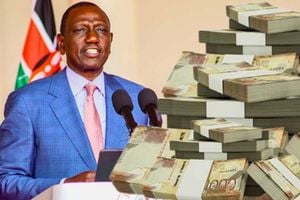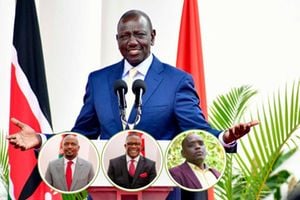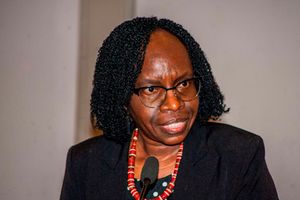
State House, Nairobi. State House and the Interior ministry spent over Sh3.8 billion outside the budget in the financial year ended June 30.
State House and the Interior ministry spent over Sh3.8 billion outside the budget in the financial year ended June 30, with little disclosure being made for the excess spend.
Controller of Budget Margaret Nyakang’o in her latest report reveals that she declined to approve nearly half the amount State House and the Interior ministry requested to spend outside the budget.
State House requested Sh2.858 billion for “national security and State functions”. All requests were made on the same day—April 9. The Controller of Budget approved expenditures of Sh1.242 billion.
The Ministry of Interior requested an additional Sh3.165 billion, mostly on what it called multi-agency security operations. Ms Nyakang’o’s office approved expenditures of Sh2.65 billion.
Spending outside the approved budget is allowed under Article 223 of the Constitution. Such spending is reserved for emergency situations such as abrupt but necessary functions and disasters, or where initially approved expenditure is insufficient. Parliament’s approval must be sought for the expenditure at most two months after the first withdrawal. Under this provision, the national government cannot spend more than 10 per cent of its approved budget for that specific financial year.
But while the emergency spending is allowed, this provision has been a subject of parliamentary investigation, such as the Sh15 billion President Uhuru Kenyatta’s administration spent days to the 2022 elections. Dr Nyakang’o told MPs she was pressured to authorise the withdrawal, out of which Sh6 billion was to pay Helios Investment in the controversial Telkom Kenya deal.
In the 2023-24 financial year, the national government spent Sh19.1 billion outside the budget. The expenditure was regularised in the supplementary budgets of November, 2023 and June this year.
Sh30.65 billion
Other ministries that spent outside their initially approved budgets were ICT (Sh221 million), Energy (Sh78 million), Agriculture (Sh3.4 billion), East African Community (Sh1 billion), Environment (Sh2.02 billion), National Treasury (Sh3.07 billion), Education (Sh177.5 million), Trade (Sh54.4 million) and Cooperatives (Sh600 million). The National Police Service spent an excess of Sh2 billion.
In total, national government institutions requested for Sh30.65 billion, according to the National Government Budget Implementation Review Report that covers the period from July 1 2023 to June 30, 2024. They were, however, only authorised to spend Sh19.1 billion. The amount came to 0.5 per cent of the national government budget.
While Dr Nyakang’o’s report does not indicate which specific national security or functions State House made its spend requests for, President William Ruto made official visits to Ghana and Guinea Bissau between April 2 and 6. On April 2, President Ruto met his Ghana counterpart Nana Akufo-Addo in Accra, where the two countris signed seven memoranda of understanding aimed at enhancing bilateral relations. He was accompanied by Prime Cabinet Secretary Musalia Mudavadi and other officials.
Four days later, President Ruto was in Guinea-Bissau for talks with General Umaro Sissoco Embalo to enhance trade ties between the two countries. Here, President Ruto’s delegation included deputy chief of staff Josphat Nanok, then Defence Cabinet Secretary Aden Duale and four other officials.
On April 8, the President commissioned Cemtech Limited’s Clinker Plant in West Pokot, hosted Muslim delegations at State House, Nairobi, on April 8 and 9 during Ramadhan, and toured Laikipia County on April 12.
State House spokesperson Hussein Mohamed maintained that the portion of funds intended for national security functions was used for those purposes.
“The nature of national security inherently means that specific details cannot be shared. National security is, after all, national security. Even in Parliament, national security issues are heard in camera. To assume otherwise as you suggest would be an act of mischief,” Mr Hussein said.
He did not, however, confirm how much of the Sh1.2 billion was spent on national security matters, and what portion was used on State functions. He also did not confirm whether the Ghana and Guinea-Bissau trips were catered for using the same funds.
The Interior ministry’s Sh2.65 billion spend was attributed to multiagency security operations, preparations for Madaraka Day 2024, local presidential functions and compensation of flood victims in Nairobi. Prof Kithure Kindiki’s ministry made eight requests to spend outside the budget between February 22 and May 27 this year.
The report also highlights the country’s financial constraints due to mounting debt, with loan repayments increasing by nearly 30 per cent in the 2023/24 financial year compared to the previous one. The original allocation to Consolidated Fund Services (CFS) in the 2023/24 financial year amounted to Sh1.96 trillion. This was revised to Sh2.08 trillion in Supplementary Budget I and then to Sh1.99 trillion in Supplementary Budget II.
This is compared to Sh1.58 trillion allocated in 2022/23, representing 45 per cent of the revised gross national budget of Sh4.43 trillion.
The growth of 26 per cent (Sh413.74 billion) towards CFS in 2023/24 compared to 2022/23 is attributed to a 29 per cent increase in debt payment obligations and a 9 per cent increase in pensions and gratuity allocations, the report explains.
It adds that the original allocation for public debt servicing in 2023/24 amounted to Sh1.75 trillion. This was revised to Sh1.87 trillion in Supplementary Budget I and Sh1.78 trillion in Supplementary Budget II, representing 90 per cent of the CFS budget. It is an increase of 29 per cent compared to Sh1.39 trillion allocated in 2022/23.
The revised public debt allocation for the 2023/24 financial year of Sh1.78 trillion, comprised of Sh850.56 billion for interest payments and Sh931.84 billion for principal payments.
Allocation towards servicing external debt amounted to Sh763.35 billion while that for domestic debt was Sh1.02 trillion.
Total expenditure on public debt in the 2023/24 financial year was Sh1.59 trillion, representing 89 per cent of the revised annual estimates, compared to Sh1.15 billion (83 per cent) recorded in the previous financial year.
County governments did not receive Sh30.83 billion for the June 2024 disbursement as per the County Allocation of Revenue Act, 2023.









